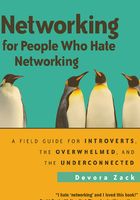
CHAPTER ONE
welcome to your field guide
Trust yourself. Then you will know how to live.
—Johann Wolfgang von Goethe
People swear up and down that I’m an extrovert.
This drives me nuts! I deny these accusations adamantly and then am subjected to a laundry list of supposed examples as to why I am mistaken. “But you give seminars for a living! You give presentations to huge groups and seem to love it! Plus, you know how to work a room …”
Blah, blah, blah.
These people have no idea what it really means to be an introvert. Plus, they assume that being an introvert by definition implies that one cannot be a strong speaker or networker.
Together, we will dispute, disprove, and knock upside the head these assumptions.
Welcome to your indispensible networking field guide for introverts, the overwhelmed, and the underconnected.
Your Author and Tour Guide
As we embark through the uncharted terrain of networking for people who hate networking, you want to be certain you are in capable hands. Why am I qualified to lead you on this journey?
First of all, despite protests from well-intentioned, ill-advised naysayers, I am an off-the-chart introvert. I am also nearly always overwhelmed and decidedly underconnected. My idea of a good time is being all alone. I have conversations with people in my head that I think actually took place. I need time to process ideas thoroughly before responding—or I get myself into trouble. The idea of a free-floating happy hour propels me into free-floating anxiety. A cacophony of external stimuli doesn’t excite me; it drives me away. I easily and naturally pick up on nonverbal cues many others miss. I prefer a few deep relationships to a large group of friends.
None of these preferences is linked to my exceptionally high energy level, propensity for public speaking, or business success. That’s because these attributes are not related to what defines introversion, a topic I have researched and taught about extensively for over fifteen years.
I am Type A, and I move fast. These traits are also not related to introversion.
Let’s have some fun. I will present examples of attributes that, to the untrained eye, may seem extrovert-centric, but with a bit of analysis emerge as introvert-friendly.
My favorite sport is running.
Even some “experts” claim that introverts are for some reason slower and less active than extroverts. This is baloney. Think about running—a fundamentally solitary sport that requires a singular focus for extended periods. The runner can think without interruption for the whole length of the run. What a perfect fit for an introvert!
I give two to three presentations weekly.
Whoa! This statistic combats most introvert stereotypes head on. Although I am a private person, I make a point of telling clients I am an introvert (on behalf of introverts everywhere). Introverts are entirely capable of being skilled public speakers. In fact, introverts prefer clearly defined roles and so may be more comfortable leading a discussion than participating in one. Many introverts are more at ease in front of a group than roaming aimlessly through a cocktail party.
I love networking.
Herein lies the book’s focus. This was not always the case for me. I discovered some wonderful techniques that turned the world of networking upside down—or shall I say right side up? You, too, can gain insights that allow you to excel at and enjoy networking. You can be a networking superstar.
Seem impossible? I am here to tell you it is not.
A Brief History of the Introvert
Many readers of this book are introverts. Many have been taught through cultural cues that introversion is a problem, a deficit, something unfortunate to hide or overcome.
From a young age, introverts receive the message that it is an extrovert’s world. Go play with others. Join in on the game. Class participation is part of your grade. Kids who withdraw around crowds are labeled as anti-social rather than applauded for being self-regulating.
Introversion is innate, and preferences are observable early on. As a kid, I asked for games to play by myself—a request that could prompt some parents to conduct a thorough psychological examination. As a parent now myself, I recognized clear traits indicating an introverted preference in one of my sons from the age of three.
THE BIG THREE
Introverts are reflective, focused, and self-reliant. These characteristics lead to the following key distinctions between introverts and extroverts:

Why not indulge yourself and use all three characteristics at once? Take some time to ponder these traits (reflective), in depth (focus), while alone (self-reliant). I’ll wait here.
Regardless of temperament, by linking your strengths to customized techniques, you will be well-positioned to network away. Introverts, extroverts, and centroverts (definition ahead!) can all benefit from this field guide.
Did I mention that I am psychic? I sense you are curious where you land in all this. Right this way …